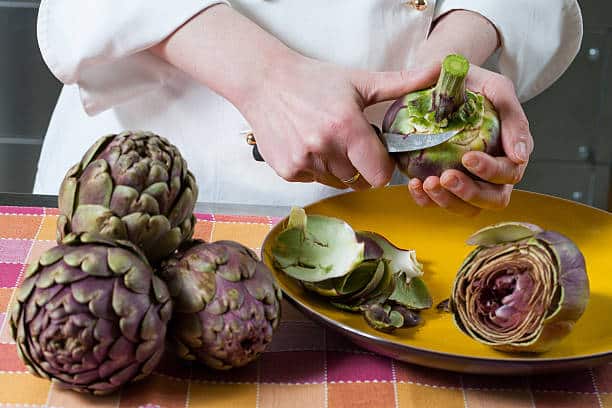Is Artichoke Good for Diabetics?-Overview
Ground artichoke, also known as Cynara cardunculus, belongs to the daisy family of plants and is widely known as an eatable vegetable species.
Artichokes are found in tree-land areas in the Mediterranean. The leaves of the artichoke are fleshy in the shape of a rose; their edges are toothed with spines.
The flower develops in ahead of eatable bud with many triangular pieces of which are twisted around it.
At present, artichoke farming is concentrated in the Mediterranean region, because it is used heavily in the region’s diet for its distinctive taste and also for promoting health.
The main exporters of the artichoke are Italy, Spain, France, and other European countries.
Artichokes have medicinal properties, such as the fact that their eatable parts are a source of active compounds such as several phenols, inulin, fibers, and minerals.
In addition, the amount of antioxidants found in the flower heads of the artichoke is one of the highest ratios recorded in vegetables.
Interestingly, some records are showing the use of this plant by Greece and the ancient Romans.
What are the Health Benefits of Artichoke?
The following are the possible health benefits of artichoke, which make people consume it regularly:
Contributing to the alleviation of indigestion. Eating dietary supplements containing ginger and ground artichoke may contribute to reducing the symptoms of functional dyspepsia such as nausea, bloating, pain, and fullness in the upper abdomen.
Help reduce cholesterol levels. Studies show that in people with high blood cholesterol, artichoke extract may contribute to reducing blood cholesterol levels in those with high blood levels.
Help reduce blood pressure. Studies show a significant decrease in the blood pressure levels in patients who have high blood pressure and eat artichoke for 12 weeks.
Alleviation of irritable bowel syndrome. while taking the leaf extract of the ground artichoke may help alleviate associated symptoms such as alternating diarrhea and constipation.
Reducing the risk of hepatitis C virus. This is because the watery extract of the leaves of the Egyptian ground artichoke plant contains the Sesquiterpene lactones and Cynaropicrin, which reduce the growth of the hepatitis C virus.
Maintenance of liver health. Ground artichoke extract can contribute to liver health and help build new cells to make up for it.
Its intake increases liver production of bile juice studies have shown that taking an artichoke extract reduces oxidative stress, liver damage from high doses of drugs, and generally improves liver function.
Other benefits of artichoke. Ingestion of the ground artichoke may contribute to mitigating the following health problems: anemia, arthritis, fluid retention, and gallbladder stones
What is the Nutritional Content of Artichoke?
The following table shows the number of nutrients present in every 100 grams of ground artichoke:
| Content | Amount |
|---|---|
| Water | 84 ml |
| calorie | 47 Kcal |
| protein | 3.27 g |
| fat | 0.15 g |
| carbohydrate | 10.51 g |
| fiber | 5.4 g |
| sugar | 0.99 g |
| calcium | 44 mg |
| iron | 1.28 mg |
| magnesium | 60 mg |
| phosphorus | 90 mg |
| potassium | 370 mg |
| sodium | 94 mg |
| zinc | 0.49 mg |
| calcium | 44 mg |
| Vitamin C | 11.7 mg |
| Vitamin B6 | 0.1 mg |
Is Artichoke Good for Diabetics?
The artichoke has a low glycemic index (below 55), meaning that it slowly raises the blood glucose levels following its ingestion.
In addition, many studies demonstrate the blood-glucose-lowering effect of ground artichoke.
Therefore, all diabetics are encouraged to consume a regular amount of artichoke under the observation of their physicians.
When You Have to Avoid Artichoke?
Taking the ground plant may cause some side effects such as intestinal gases, stomach upset, and diarrhea.
It should also be noted that it is recommended that people with certain health problems should avoid taking the ground artichoke, such as:
Bile duct obstruction
Taking ground artichoke may increase the flow of bile, so people with this problem are advised to avoid taking ground artichoke before consulting a doctor.
Kidney stones
Ingestion of the ground artichoke may worsen the condition of people with kidney stones, as it may contribute to an increased flow of bile juice that contributes to the production of kidney stones.
Allergic to daisy plants
Raged-weed, common daisy, and other similar herbs are daisy species plants.
Allergic to these plants are more likely to have an allergic reaction to taking the ground artichoke, so they are advised not to take it until after medical consultation.
See Also
Is Cauliflower Good for Diabetes
References
https://www.ncbi.nlm.nih.gov/
https://www.webmd.com/
